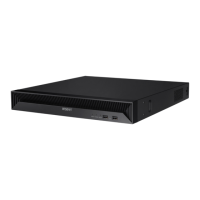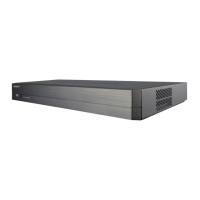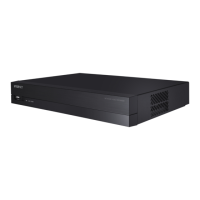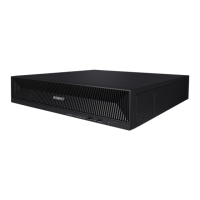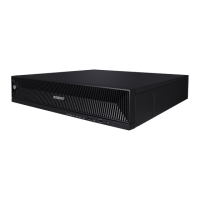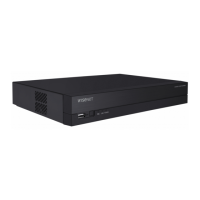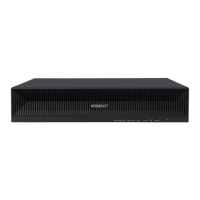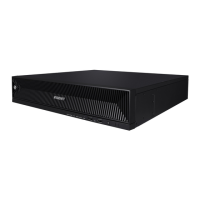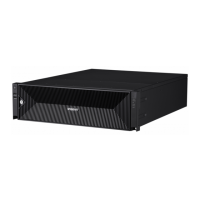Do you have a question about the Wisenet XRN-810S and is the answer not in the manual?
Crucial safety guidelines to follow before operating the unit to prevent hazards and damage.
Information on compliance with FCC rules and standards for digital devices.
Important warnings regarding battery replacement and handling to prevent hazards.
Important cautions regarding power cord connection and mains plug usage.
Procedures and recommendations for safely shutting down the system to prevent data loss or damage.
Details the operational temperature range for the product and its internal HDD for optimal performance.
Specifies the intended use and limitations for the Ethernet port for indoor use only.
Emphasizes changing the administrator password regularly for data protection and preventing information theft.
Lists the items included in the product package for the NVR unit.
Describes how to use the numeric buttons on the remote control for channel selection.
Provides instructions on how to match the remote control ID with the NVR's ID for proper operation.
Details environmental checks required for proper product installation and operation to prevent failure.
Instructions for installing the NVR unit into a rack using bracket-rack and screws.
Guides on how to add a hard disk drive, including safety precautions and compatibility checks.
Important notes on handling HDDs to prevent data loss and product damage.
Lists specific scenarios and actions that can lead to HDD or data damage.
Provides specific cautions to observe during the physical installation of a HDD into the NVR.
Step-by-step instructions for installing a new or used HDD into the NVR, including formatting.
Detailed steps with illustrations for installing an HDD in the XRN-410S model.
Detailed steps with illustrations for installing an HDD in the XRN-810S model.
General guidance and figures for connecting external video output and audio devices.
Instructions on how to connect USB devices like HDDs or memory sticks to the NVR.
Explains how to connect alarm input and output ports for event monitoring and control.
Illustrates network connection setup using Ethernet.
Illustrates network connection setup using a router.
Shows how to connect network cameras using PnP mode and manual mode.
Illustrates how to set up an internet connection using PPPoE.
Guides the user through the initial system startup and setup process.
Steps to power on the NVR and initiate the system startup sequence.
Walkthrough of the installation wizard for initial configuration of language, password, and network.
Explains how to set or change camera passwords, especially in bulk.
Provides guidelines and rules for creating strong and secure passwords.
Instructions on how to properly shut down the NVR system to prevent data loss.
Procedure for logging into the NVR interface with user credentials.
Details the icons displayed on the live screen and their corresponding functions and status.
Lists common error icons and their meanings, guiding users to contact support.
Describes how to access and use the live screen context menu for various operations.
Explains the menu options available when viewing a single camera feed.
Lists and describes the context-sensitive menu options available in split-screen live view.
Instructions on how to access and use the launcher menu for quick access to functions.
Details how to change the screen display mode using the launcher menu or remote control.
Describes how to switch between different split screen modes for viewing multiple channels.
Explains how to configure the automatic switching of live camera views.
Explains how to check connection status and other details for each camera channel.
Details the information displayed about live camera status, including model, IP, codec, and resolution.
Explains how to check recording status, type, frames, and data volume for each channel.
Describes how to check the PoE status for each port and the overall power consumption.
Guides on how to select and switch channels in split screen or single mode.
Step-by-step guide to creating and configuring new live view layouts for camera channels.
How to turn audio on or off for individual channels in live mode.
Instructions on how to temporarily pause and resume live video playback.
How to set up and view events like motion detection or video loss in synchronization with live feeds.
Steps for capturing a still image of the live screen and saving it.
Adjusts the screen ratio for all displayed channels in live split screen mode.
Adjusts the screen ratio for a specific channel in live single or split screen mode.
Information about activating PTZ control for connected PTZ cameras.
Basic steps to start using PTZ controls for compatible cameras.
How to use PTZ cameras for monitoring and configuring custom settings like presets.
Explains how to set and manage preset camera positions for PTZ cameras.
Step-by-step instructions to add a new preset position for a PTZ camera.
How to modify or remove existing preset camera positions.
Information on using the Digital PTZ function for distortion-corrected screens.
How to check the available and used capacity of backup storage devices.
Step-by-step process for initiating a backup operation for recorded data.
Overview of system setup options including date, time, language, user, and properties.
How to configure date, time, time zone, DST, and language settings.
Detailed steps for setting date, time, language, and time zone properties.
How to select specific dates as holidays for schedules.
Instructions on using the calendar interface for date selection.
How to set and change the administrator's ID and password for full system access.
Instructions on using the on-screen virtual keyboard for text input.
Steps to create a new user group for managing permissions.
How to assign specific permissions to user groups for accessing NVR functions.
Detailed steps for registering a new user account with specific group and viewer permissions.
Defines how to set access restrictions for menu items and user functions.
How to restrict remote access via Web Viewer or Network Viewer.
Setting the automatic logout timer for user sessions due to inactivity.
Option to enable or disable manual ID input during the login process.
Explains user behavior and accessible menus when a user has restricted access.
How users with restricted access can change their own passwords.
How to check current software version, MAC address, and system details.
Step-by-step guide for updating the NVR's software to a newer version.
Continues the software upgrade process by selecting the recognized device.
How to copy and import NVR settings using a storage media.
How to browse system logs, events, and timestamps for system activities.
Guides on how to view system logs for startup, shutdown, and setting changes.
How to search and view recorded events like alarms, camera events, and video loss with timestamps.
How to inquire about backup operations, including user, time, and device details.
Procedures for registering network cameras and managing their connection settings.
Step-by-step guide to add and connect network cameras to the NVR.
Instructions for registering cameras using Plug-and-Play (PnP) mode.
How to automatically search for and register network cameras on the network.
Steps for manually searching and registering network cameras by specifying their details.
How to select the address type (Static, DDNS, URL) for camera connection.
Entering the IP address, device port, and HTTP port for camera connection.
Providing the user ID for camera registration.
Entering the password for camera registration.
Configuring camera connection using ONVIF or RTSP protocols.
Troubleshooting common camera registration errors and their meanings.
Setting additional configuration options for cameras using the ONVIF protocol.
Managing video profiles for registered cameras, including adding and deleting.
Managing camera user accounts and their settings.
Configuring network settings for cameras, including IP type and DHCP.
Notes on how profile changes may affect baud rates and stream formats.
How to apply camera settings and watch the live video simultaneously.
Adjusting settings related to digital wide dynamic range for dark and bright areas.
Configuring backlight settings to balance bright and dark areas in the image.
Adjusting camera exposure settings like brightness, shutter, and gain.
Configuring mode to adjust color, contrast, and switching times for day and night vision.
Settings for DIS (shaking compensation) and Defog levels.
Adjusting camera video focus and initialization settings.
Configuring mirror and flip modes for the camera image.
Setting up distortion correction for fisheye cameras.
How to change passwords for all registered cameras simultaneously.
Changing live transfer settings for network cameras, including profiles and codecs.
Configuring video settings for each individual camera channel.
Checking storage device status, capacity, usage, and formatting options.
Checking the temperature of the HDD mounted in the NVR.
Displaying the usage time of an HDD.
Steps to format a selected storage device, including warnings about data deletion.
Setting up Auto Recovery Backup for videos lost due to camera disconnection.
Configuring monitor output settings, including displayed information and dwell time.
Adjusting the position of displayed data on the monitor if it's cut off.
Setting up text devices and events, including device names and encoding types.
Configuring relevant values for connected devices.
Setting up event keywords for alarms and notifications.
How to schedule recordings for specific dates and times.
Explains color coding for different recording types in the record setup screen.
Setting resolution, frame rates, and data transfer limits for recording by channel and type.
Configuring video profile settings for network cameras for recording purposes.
Setting options for what happens when HDD capacity is full (stop recording or overwrite).
Setting sensor operation modes, connected cameras, and alarm outputs.
Applying sensor settings to multiple channels or sensors.
Configuring the operation mode of sensors (N.O/N.C).
Selecting a camera channel to connect to a sensor.
Setting the alarm output method for events.
Setting the duration for alarm signals and sounds.
Configuring NVR and camera event modes, alarm outputs, and alarm times.
Setting up alarms for video loss or camera disconnection.
Applying settings to specific camera channels.
Selecting event detection types like motion detection or camera events.
Enabling or disabling video loss detection.
Selecting the method for alarm output.
Specifying the duration of the alarm output.
Setting scheduled alarms based on day of the week and time.
Setting the network connection route and protocol.
Configuring network protocols and connection environments.
Guides on connecting and setting up the network based on the environment (no router, with router).
Network setup instructions when no router is present.
Configuring static IP settings for internet connection.
Configuring DHCP settings for automatic IP assignment.
Setting up PPPoE connection with user ID and password.
Network setup instructions when a router is used.
Configuring static IP settings for the NVR when connected to a router.
Checking and setting IP address, gateway, and subnet mask in the NVR.
How to configure DHCP settings on a broadband router.
Setting up Dynamic Domain Name System (DDNS) for remote access.
Configuring DDNS settings in the NVR and on the router.
Setting up IP addresses to allow or block access to the NVR.
Configuring video profile settings for network transmission.
Sending emails for events or at specific time intervals.
Setting up the SMTP server for sending emails.
Creating and managing recipient groups and users for email notifications.
Using SNMP for remote network device monitoring.
Configuring network settings for the DHCP server, including IP range and lease time.
Step-by-step instructions to configure the DHCP server settings.
Checking IP and MAC addresses used by DHCP server and network port.
Steps to run the P2P service, including connecting and installing the mobile app.
Performing searches for recorded data by time or event criteria.
Searching for recorded data within a specific date and time range.
Explains the color codes used to represent different recording types.
Searching for recorded events by channel, date, and event type.
Performing searches based on specific areas of interest or exclusion within an image.
Searching data entered into POS systems connected to the NVR.
Searching for backup data in connected backup devices.
Searching for ARB (Auto Recovery Backup) data stored on devices.
Playing back stored data and backing up desired portions.
How to play recorded data from HDD or backup, and navigate through it.
Accessing the menu options while a video is playing back.
Explains the purpose and functionality of the WebViewer software.
Step-by-step instructions for connecting to the NVR using the Web Viewer.
Lists the main features and capabilities of the Web Viewer.
Specifies the minimum and recommended hardware and OS requirements for running Web Viewer.
Instructions for accessing the web viewer using different browsers and managing plugins.
Guidance on logging into the plug-in-free web viewer interface.
Identifies and describes the layout of the live viewer screen interface.
Explains the layout and components of the Live Viewer screen.
Describes the menu options available within the Live Viewer interface.
Explains how to check the status or operation of the NVR using icons on the live screen.
Steps for capturing a screenshot of the live viewer and saving it.
Instructions on how to print the current screen from the live viewer.
Steps to create a new layout for camera channel arrangement.
How to rename an existing layout.
How to save the configured layout for future use.
How to remove an existing layout.
Configuring the screen switching function to view layouts sequentially.
Activating the switching mode and running a sequence of layouts.
Details on how auto sequence works in split mode and its time settings.
How to use the PTZ controls via the interface for connected cameras.
Detailed list of PTZ control items and their descriptions.
Instructions on how to set and save preset camera positions.
How to activate a saved preset position for a PTZ camera.
How to use the digital zoom function to magnify live video feeds.
Using digital PTZ features on fisheye camera views.
How to use the D-PTZ function for cameras that support it.
Overview of the Search Viewer interface for finding and playing recorded footage.
Explains the layout and components of the Search Viewer screen.
Navigating between different menu screens in the viewer.
Using the calendar to select dates for searching recorded videos.
Selecting specific channels for searching recorded data.
Performing searches for recorded data based on selected criteria.
Searching data entered into POS systems connected to the NVR.
Searching recorded data by specifying date and time.
Explains the color codes used to represent different recording statuses.
Adjusting the timeline for viewing recorded data, including zooming and navigating.
Backing up search results to a storage device in various formats.
Selecting and backing up a specific section of recorded video.
Steps to perform a text search by selecting date, keywords, and conditions.
How to replay search results using ON/OFF buttons.
Overview of the Setup Viewer interface and its navigation elements.
Configuring various system settings for the NVR.
Settings for date, time, language, and DST.
Managing user accounts, administrator settings, and permissions.
System information, software upgrades, settings backup, and log information.
Applying NVR configurations using storage devices.
Viewing system logs for various activities.
Listing and viewing recorded events like sensor, camera, or video loss events.
Inquiring about backup operations and their details.
Registering network cameras and managing their settings.
Adding new network cameras to the NVR.
Changing settings for connected network cameras.
Changing passwords for all registered cameras at once.
Changing live transfer settings for network cameras.
Configuring video settings for each camera channel.
Checking storage device status, capacity, usage, and formatting options.
Setting alarm output ports and durations for HDD errors.
Setting device names and encoding types.
Setting total amount conditions and keywords for text device events.
Information on setting the recording schedule and related settings.
How to schedule recordings for specific dates and times.
Setting recording frame rates for normal and event recording.
Setting the recording profile for network cameras.
Setting the Disk End Mode for recording behavior when HDD is full.
Setting event configurations, including sensor detection and camera events.
Configuring sensor operation, camera connection, and alarm outputs.
Setting NVR and camera event modes, alarm outputs, and times.
Setting up alarms for video loss or camera disconnection.
Scheduling alarm outputs based on day and time.
Checking network connection mode and IP address.
Configuring protocol-related settings for network connections.
Setting up Dynamic Domain Name System (DDNS) for remote access.
Setting up IP addresses to allow or block access.
Selecting security connection systems and installing public certificates.
Setting up 802.1x protocol and installing certificates for network security.
Setting video profile transmitted to the network.
Specifying SMTP server and recipient groups for email notifications.
Configuring the mail server and authentication process.
Setting event intervals and specifying events for mail notifications.
Setting groups and recipients for email notifications.
Using SNMP for remote network device monitoring.
Setting up the DHCP server's network configuration.
Checking IP and MAC addresses used by DHCP server and network port.
Explains the usage of various icons in the setup viewer interface.
Querying text devices and data.
Instructions for registering cameras and setting resolution/shots.
Manually entering backup details like channel and time.
Overview of the SEC Backup Viewer for playing SEC format backup files.
Lists PC hardware and OS requirements for optimal viewer performance.
Minimum and recommended specifications for running the backup viewer.
Supported browsers for accessing the viewer.
Describes various functions and controls within the backup viewer interface.
Detailed technical specifications for NVR models XRN-410S and XRN-8105.
Lists specifications for language, OS, web browser, viewer software, functions, and camera control.
Details the factory default settings for various NVR parameters.
Lists default settings categorized by function for different NVR components.
Provides solutions for common problems encountered with the NVR and its features.
Lists common issues and their corresponding actions for resolution.
Continues troubleshooting common problems and provides solutions.
| Model | XRN-810S |
|---|---|
| Type | Network Video Recorder |
| Video Channels | 8 |
| Max. Number of Channels | 8 |
| Storage Capacity | Up to 6TB |
| Maximum Internal Storage | 6TB |
| Video Compression | H.265, H.264, MJPEG |
| Audio Input/Output | 1/1 |
| Alarm Input/Output | 4/2 |
| USB Ports | 2 x USB 2.0 |
| Operating Humidity | 10% to 90% (non-condensing) |
| Input Voltage | 12VDC |
| Power Supply | External Power Adapter |
| Hard Drive Bays | 1 Bay |
| Network Interface | 1x RJ45 (10/100/1000Mbps) |
| Video Output | HDMI, VGA |
| Operating Temperature | 0°C to 40°C |
| Power Consumption | 30W |
